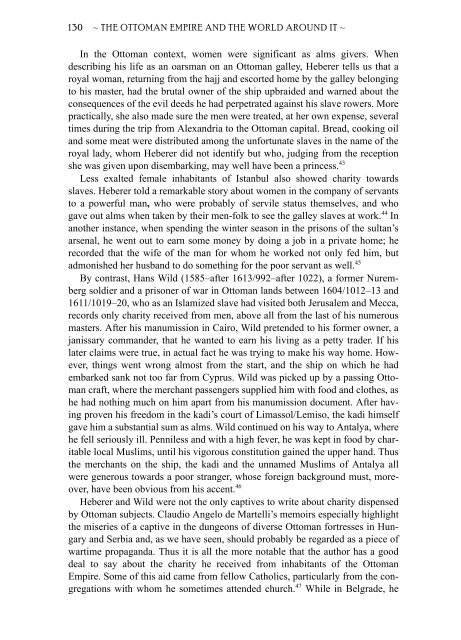The Ottoman Empire and the World Around It - Course Information
The Ottoman Empire and the World Around It - Course Information
The Ottoman Empire and the World Around It - Course Information
You also want an ePaper? Increase the reach of your titles
YUMPU automatically turns print PDFs into web optimized ePapers that Google loves.
130 ~ THE OTTOMAN EMPIRE AND THE WORLD AROUND IT ~<br />
In <strong>the</strong> <strong>Ottoman</strong> context, women were significant as alms givers. When<br />
describing his life as an oarsman on an <strong>Ottoman</strong> galley, Heberer tells us that a<br />
royal woman, returning from <strong>the</strong> hajj <strong>and</strong> escorted home by <strong>the</strong> galley belonging<br />
to his master, had <strong>the</strong> brutal owner of <strong>the</strong> ship upbraided <strong>and</strong> warned about <strong>the</strong><br />
consequences of <strong>the</strong> evil deeds he had perpetrated against his slave rowers. More<br />
practically, she also made sure <strong>the</strong> men were treated, at her own expense, several<br />
times during <strong>the</strong> trip from Alex<strong>and</strong>ria to <strong>the</strong> <strong>Ottoman</strong> capital. Bread, cooking oil<br />
<strong>and</strong> some meat were distributed among <strong>the</strong> unfortunate slaves in <strong>the</strong> name of <strong>the</strong><br />
royal lady, whom Heberer did not identify but who, judging from <strong>the</strong> reception<br />
she was given upon disembarking, may well have been a princess. 43<br />
Less exalted female inhabitants of Istanbul also showed charity towards<br />
slaves. Heberer told a remarkable story about women in <strong>the</strong> company of servants<br />
to a powerful man, who were probably of servile status <strong>the</strong>mselves, <strong>and</strong> who<br />
gave out alms when taken by <strong>the</strong>ir men-folk to see <strong>the</strong> galley slaves at work. 44 In<br />
ano<strong>the</strong>r instance, when spending <strong>the</strong> winter season in <strong>the</strong> prisons of <strong>the</strong> sultan’s<br />
arsenal, he went out to earn some money by doing a job in a private home; he<br />
recorded that <strong>the</strong> wife of <strong>the</strong> man for whom he worked not only fed him, but<br />
admonished her husb<strong>and</strong> to do something for <strong>the</strong> poor servant as well. 45<br />
By contrast, Hans Wild (1585–after 1613/992–after 1022), a former Nuremberg<br />
soldier <strong>and</strong> a prisoner of war in <strong>Ottoman</strong> l<strong>and</strong>s between 1604/1012–13 <strong>and</strong><br />
1611/1019–20, who as an Islamized slave had visited both Jerusalem <strong>and</strong> Mecca,<br />
records only charity received from men, above all from <strong>the</strong> last of his numerous<br />
masters. After his manumission in Cairo, Wild pretended to his former owner, a<br />
janissary comm<strong>and</strong>er, that he wanted to earn his living as a petty trader. If his<br />
later claims were true, in actual fact he was trying to make his way home. However,<br />
things went wrong almost from <strong>the</strong> start, <strong>and</strong> <strong>the</strong> ship on which he had<br />
embarked sank not too far from Cyprus. Wild was picked up by a passing <strong>Ottoman</strong><br />
craft, where <strong>the</strong> merchant passengers supplied him with food <strong>and</strong> clo<strong>the</strong>s, as<br />
he had nothing much on him apart from his manumission document. After having<br />
proven his freedom in <strong>the</strong> kadi’s court of Limassol/Lemiso, <strong>the</strong> kadi himself<br />
gave him a substantial sum as alms. Wild continued on his way to Antalya, where<br />
he fell seriously ill. Penniless <strong>and</strong> with a high fever, he was kept in food by charitable<br />
local Muslims, until his vigorous constitution gained <strong>the</strong> upper h<strong>and</strong>. Thus<br />
<strong>the</strong> merchants on <strong>the</strong> ship, <strong>the</strong> kadi <strong>and</strong> <strong>the</strong> unnamed Muslims of Antalya all<br />
were generous towards a poor stranger, whose foreign background must, moreover,<br />
have been obvious from his accent. 46<br />
Heberer <strong>and</strong> Wild were not <strong>the</strong> only captives to write about charity dispensed<br />
by <strong>Ottoman</strong> subjects. Claudio Angelo de Martelli’s memoirs especially highlight<br />
<strong>the</strong> miseries of a captive in <strong>the</strong> dungeons of diverse <strong>Ottoman</strong> fortresses in Hungary<br />
<strong>and</strong> Serbia <strong>and</strong>, as we have seen, should probably be regarded as a piece of<br />
wartime propag<strong>and</strong>a. Thus it is all <strong>the</strong> more notable that <strong>the</strong> author has a good<br />
deal to say about <strong>the</strong> charity he received from inhabitants of <strong>the</strong> <strong>Ottoman</strong><br />
<strong>Empire</strong>. Some of this aid came from fellow Catholics, particularly from <strong>the</strong> congregations<br />
with whom he sometimes attended church. 47 While in Belgrade, he


